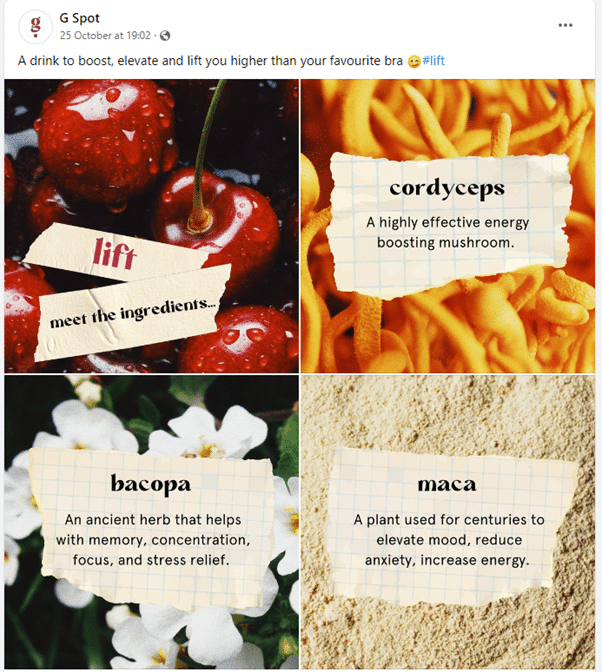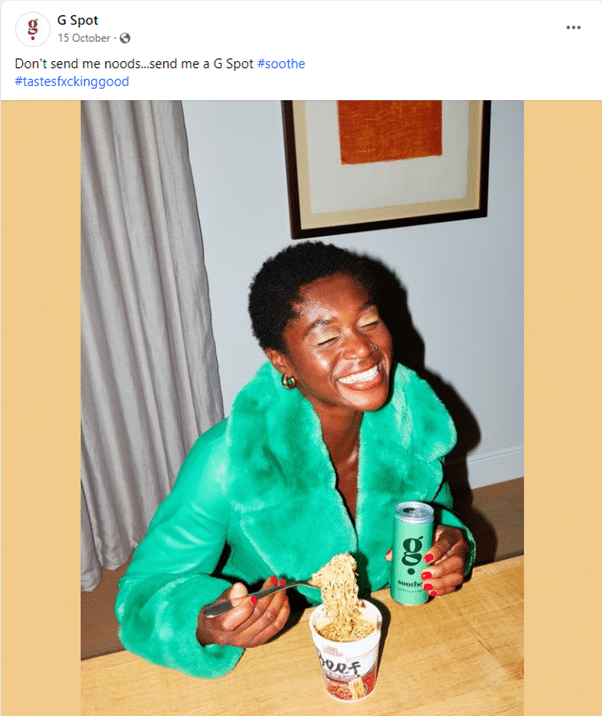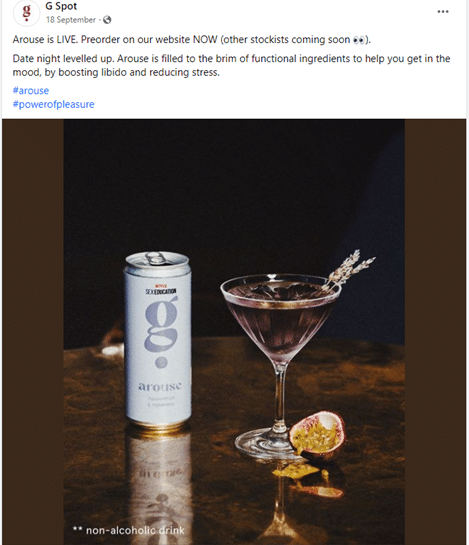There must be few people, internationally, more universally loved than Gillian Anderson. She shot to fame in the 90s as the iconic skeptic Dana Scully, played a delightfully-tongue-in-cheek version of herself in A Cock and Bull Story, returned to the small screen in the acclaimed The Fall, and then found a new legion of younger fans as sex therapist Jean Milburn in Sex Education.
Along the way, she has been a consistent advocate for women’s rights, LGTBQ rights, and children’s rights, plus she’s an outspoken environmental activist. On top of that, she comes across as down to earth and always willing to poke fun at herself. I think we can all agree, she’s a delight.
Which is why it is so utterly disappointing to see her become the face – and, indeed, the founder – of a new range of wellness products whose marketing is replete with misleading health claims.
The G-Spot range of soft drinks, founded by Anderson during the pandemic, are marketed via the kind of knowing, playful, sexually-tinged wink that has been synonymous with the former X Files actor over at least the last two decades. Their tagline is “Where you do you”. They are called “G-Spot”. The range of drinks has names like “Arouse”. The whole company was launched with a tongue-in-cheek advert where Gillian wears a sparkly jacket and a pair of bunny ears, in a bedroom where the bed is adorned with rose petals and pink fluffy handcuffs, making jokes about how she doesn’t want to read the sexualised script. Instead, she says the product is:
Wellness with a wink. Kind of fun, cheeky, it’s good for you, but it tastes good
She explains that she drinks too many soft drinks and not enough water. So she decided to make her own soft drink, and started talking to people about functional drinks and nootropics, which she says are known for their healing properties and for boosting cognitive function and performance. “Before I knew it, one thing led to another, and I found my G-Spot” she says, while being handed a can of her “Lift” product.
Wellness with a wink is very much the brand, here. Customers are encouraged to tweet about the product using the hashtag “tastesfxckinggood”. Their social media includes posts like “A drink to boost, elevate and lift you higher than your favourite bra” and “GIRL MATH …Naughty & Nice + Sweet & Spice = AROUSE” and “Don’t send me noods…send me a G Spot #soothe”.


This wellness with a wink approach is almost certainly attaching itself to Anderson’s success in the hit show Sex Education, where she plays sex therapist Jean Milburn. In fact, of the four products on sale as part of the range, the most recent is their “Arouse” product, which explicitly has the Netflix Sex Education logo on every can and in every advert. This is brand synergy.
You might think it’s disappointing that Gillian would take the money to put her name to a product like this, but it’s worse than that. She’s the founder of the company. This is her company. G Spot is as much Gillian Anderson as Goop is Gwyneth Paltrow.
What makes this all the more dispiriting is that the concept of “functional nootropics” drinks is based on incredibly shaky ground, at best. Drinks can obviously be functional, but for most commercially-available, non-caffeinated drinks, that function is hydration, thirst-quenching, and sustenance. Some drinks can boost energy, via ingredients like caffeine, or sugar – but these are ingredients G Spot makes a virtue of being free from.
What do G Spot drinks contain, and what do those ingredients do? The answer to that question very much depends on when you asked that question. In early 2023, if you had visited their website, you’d have seen a wide range of misleading claims. For example, their “Protect” product featured the following the ingredient list:
GINGER – Is a powerful antioxidant. It has anti-bacterial and anti-inflammatory properties which help support a healthy immune system. Making it a go-to-herb for fighting the common cold.
TURMERIC – Has been used in Ayurvedic medicine for over 4000 years for its immune supporting properties. Curcumin is its active compound and is anti-inflammatory and an effective antioxidant.
CHAGA – Is packed full of powerful antioxidants which help to protect and support the immune system and fight inflammation and infection.
Unfortunately, there’s no good evidence that these ingredients actually have any of these claimed properties. What’s more, even if you could prove that ginger, turmeric and chaga actually had such beneficial applications, there’s then no evidence that those ingredients exist in sufficient quantity in the G Spot product to mean that drinking a can of “Protect” can actually help fight infection and ill-health, which is what is clearly being suggested by the company. Even the product name, “Protect”, misleadingly suggests it offers health benefits.
The same is true for their other products. For the Lift product, its ingredients list claims:
BACOPA is used for its effect on brain function, that it contains powerful antioxidants and anti-inflammatory properties it helps to support the Immune system, and that it helps with memory, concentration, focus, and stress relief.
THEANINE can directly impact our brain function by improving sleep, maintaining mood and reducing the impact of stress, in turn increasing energy.
LION’S MANE Supports the immune system, Digestive system and Central nervous system” and “helps protect our cognitive function by improving concentration, mood and memory.
CORDYCEPS – Increases the production of ATP therefore increasing our energy levels throughout the day.
Again, even if those things were true, that doesn’t mean that drinking the Lift product will increase ATP production or energy levels throughout the day. If the company want to say that it does, they have to prove that the product itself can do that.
As for their Soothe product, they claim:
MAGNESIUM has a direct impact on the regulation of our Central Nervous System, helping to ease stress and support mood.
REISHI has been used for centuries for its stress reducing and calming abilities, as well as alleviating symptoms of anxiety. It has been named ‘The mushroom of eternal youth’ for its ability to regulate the Central Nervous System.
ASHWAGANDHA calms the Central nervous system, promotes sleep and is a modern day stress buster!
MACA contains antioxidants and nutrients that have been used for many symptoms including fatigue, hormone regulation, libido, and cognition. Maca can improve energy and reduce symptoms of stress, by calming the Central Nervous system.
Interestingly, the page for Soothe also includes a heath disclaimer:
This product is not intended to diagnose, treat, cure, or prevent any disease
Which would be good to see, if it wasn’t immediately undermined by the very next sentence:
Although for many people the effects of the drinks can be felt right away, the full medicinal properties of G Spot’s ingredients are most effective when consumed daily over time.
It seems remarkably disingenuous to argue that this product has explicitly “medicinal” benefits that kick in right away, and get stronger with daily consumption… but aren’t intended to diagnose, treat, cure or prevent anything.
As is ever the case, the website includes an FAQ where the unsubstantiated health claims continue.
Does G Spot contain caffeine?
No, G Spot does not contain any caffeine – the increased energy felt from Lift comes from the Cordyceps mushroom’s ability to increase ATP production in our cells, therefore increasing energy and alertness on a cellular level, pretty much right away.
Until they can prove that their product actually does increase energy, they don’t get to tell us where that extra energy comes from, nor can they tell us we’ll feel “alertness on a cellular level”.
Meanwhile, descriptions here of the Lift product repeat the claim that it can give a boost to energy and focus, and the Protect product claims again to offer “complete medicinal immune system supporting properties”.
These products are clearly making a range of health claims that are not supported by evidence, and the celebrity endorsement of Gillian Anderson is likely to persuade consumers that these health claims are true, and that these products are worth buying.
Still, that was the content of the marketing copy earlier in the year… but it is not what a reader will find if they head to the G Spot website now. The reason for the change? In June, I made a complaint to the Advertising Standards Authority, who agreed with me that there were issues with the company’s wording. They took this up with G-Spot, who dutifully changed their marketing copy to avoid being named in a ruling by the ASA.
Unfortunately, the updated copy isn’t substantially better, and still – in my opinion – contains a range of unevidenced health claims. For the Soothe product, while the explicit claims for the ingredients have been removed, the page now claims that magnesium is “often associated with sleep and mood”, that Reishi is “traditionally associated with mood and stress reduction”, and that Theanine is “mainly associated with anxiety and stress relief” and “increases GABA, serotonin and dopamine levels”.
The implication to the consumer here is clearly that this product has those direct health benefits, even though there is no evidence to suggest that’s the case. It also very much seems that vague terms like “associated with” are being used to continue making health claims about the product, in the hope that they can sidestep the need to provide evidence.
Furthermore, the issue is not whether each of these ingredients can be shown to have any of these effects – the issue is still whether them exist in sufficient measure to give the Soothe product these effects. The implication to the consumer, clearly, is that they do – but there is still absolutely no evidence that this is the case.
The same is true of the updated Protect product. The explicit claims for ginger, peppercorn, turmeric, and chaga have been removed, but they’re replaced with the same implicit language of “used in many cultures for” and “revered for” and “used traditionally … as”. Despite this less committed language, the average consumer will still take away from this information the message that ginger works as an antibiotic, turmeric is an antioxidant and anti-inflammatory, and that chaga is an “immunity booster”. They will also take from this messaging that the Protect product, by extension, has all of those same health benefits – even though there is no evidence for that.
And then there’s the Lift product. Again, the explicit claims for the ingredients have been removed (in fact, the key ingredients list itself has even been changed), but the wording is replaced with the same implicit language of “revered for its association with” and “often used… with the aim of” and “traditionally used for”. And again, despite this less committed language, most will take away the messages that bacopa aids memory and concentration and reduces anxiety, ribose reduces fatigue, maca lifts mood and reduces anxiety, and that cordyceps increases energy and performance. Plus, that the Protect product, by extension, has all of those same health benefits – but there is no evidence that this is the case.
As for the FAQs, G Spot never actually removed the sections I complained about in June, so it still tells customers to drink Life when they need energy, and Protect when they want to experience complete medicinal immune system-supporting properties – properties it has not been shown to have. And it still tells you that the Cordyceps in the drinks will increase your energy and alertness on a cellular level. Which, if it can, G Spot need to demonstrate, not just state.
On top of those three products, since my June complaint, G Spot also launched their fourth product, “Arouse”, complete with its own range of problematic advertising claims. The ingredients list for the Arouse product now claims that:
Butterfly Pea is can increase blood flow and sexual desire.
L-arginine increases “flow” to sexual organs and can improve libido.
L-Citrulline improves blood flow.
Vitamin B6 regulates hormonal activity, reduces tiredness and reduces fatigue.
These are all clearly health claims, and it is not clear that there is any evidence for these claims for any of these ingredients. And, again, even if there were evidence for individual ingredients, it is not clear that the resulting effect is that the Arouse product can have any of these health benefits – which is the clear implication of this messaging.
This product is being marketed as a way of improving libido, sexual desire, as is clear from their social media posts – including a Facebook post that reads:
Date night levelled up. Arouse is filled to the brim of functional ingredients to help you get in the mood, by boosting libido and reducing stress. #arouse #powerofpleasure

All of which means I’ve sent a new complaint to the ASA, pointing out that plenty of the problematic text hasn’t actually been touched, and that the changes they’ve made don’t actually address the main concerns. I’ll be awaiting to hear what the ASA does next, and whether Gillian Anderson and the G-Spot team decide to change things, or whether their advertising continues to offer misleading information to customers.
So if you’re reading this, Gillian Anderson, please put more consideration into how you market your products. It’s absolutely fine to invent a new caffeine-free soft drink, and it’s fine (fun, even!) to market it with a wink. But when it comes to making direct claims about the health and wellbeing benefits of your new product range, you need to provide some evidence, lest you end up misleading the very consumers you’re seeking to empower.
Perhaps you should take a lead from your most famous role, and be a little more skeptical.


